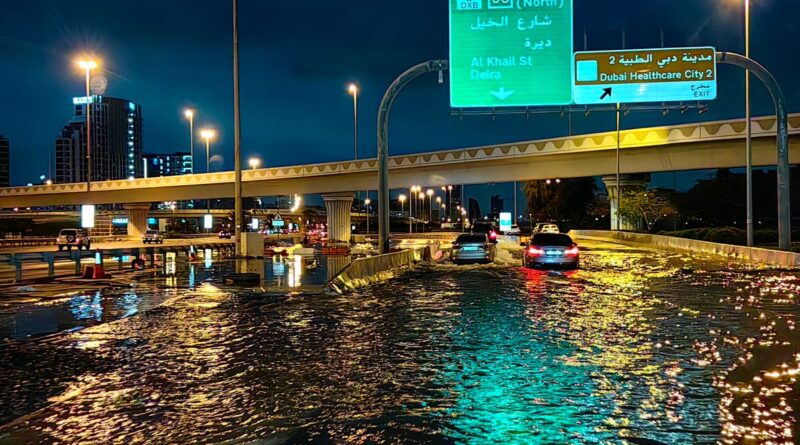Dubai airport flooded after year and a half’s worth of rain falls on city in one day
Dubai was drenched in a year and a half’s worth of rain in a single day, killing at least one person and disrupting travel through the world’s busiest airport.
Parts of the financial capital were brought to a halt on Tuesday as almost 6 inches of rain fell on the city, according to official meteorological data. It was more than what the city gets in over a year.
Photos and videos showed giant highways submerged in water, cars stuck, and damage to homes and businesses. Authorities and communities across the United Arab Emirates were clearing debris on Wednesday after the torrential downpour killed at least one person.
Dubai Airport, one of the busiest in the world and a crucial connecting spot for long-distance flights, diverted several planes causing travel chaos as the runway was seen covered in knee-deep water.
Passengers waited for hours for their flights and struggled to reach terminals through the floodwater covering surrounding roads.
On Wednesday, the airport was still functioning on limited capacity. On X, the airport authority wrote there were “limited transportation options” and affected flights as aircraft crews couldn’t reach the airfield.
“Recovery will take some time,” the airport said. “We thank you for your patience and understanding while we work through these challenges.”
Some aircraft had been diverted to Al Maktoum International Airport at Dubai World Central, the city-state’s second airfield.
One couple described the situation as “absolute carnage”.
“You cannot get a taxi. There’s people sleeping in the metro station. There’s people sleeping in the airport,” The Associated Press reported one of the passengers as saying, speaking on the condition of anonymity as the country restricts criticism.
Paul Griffiths, the airport’s CEO, said it was an “incredibly challenging time” and that every place an aircraft could be safely parked was taken.
“In living memory, I don’t think anyone has ever seen conditions like it,” Mr Griffiths told the state-owned talk radio station Dubai Eye.
“We are in uncharted territory, but I can assure everyone we are working as hard as we possibly can to make sure our customers and staff are looked after.”
The state-run WAM news agency called the rain Tuesday “a historic weather event” that surpassed “anything documented since the start of data collection in 1949.”
Rain also drenched Bahrain, Qatar, Saudi Arabia and Oman, killing at least 18 people in the latter.
However, the intensity was the highest in the UAE. Dubai receives about 3.7 inches of rain in a year, but within a day it received 5.7 inches.
The UAE government had issued warnings ahead of the heavy rains, urging people to stay at home and only leave “in cases of extreme necessity”.
Schools across the seven emirates were shut and people were asked to work remotely until Wednesday.
In Ras al-Khaimah, the country’s northernmost emirate, police said one 70-year-old man died when his vehicle was swept away by floodwater.
The rainfall was a result of a storm system moving across the middle-east which intensified around 9am on Tuesday, drenching the desert region and covering it with water.
However, scientists say there are several factors that have exacerbated the rainfall, including UAE’s cloud seeding operations and man-made climate crisis.
“It is highly likely that the deadly and destructive rain in Oman and Dubai was made heavier by human-caused climate change,” Federike Otto, co-founder of World Weather Attribution WWA) which studies links between weather events and climate crisis and professor at Imperial College London, told AFP.
Rainfall of this intensity is highly unusual in Dubai, leaving the arid city unprepared to tackle large-scale flooding in absence of proper drainage facilities. The city, which hosted last year’s climate summit, Cop28, was also flooded right before the summit.
Authorities on Wednesday were sending trucks to flooded regions to pump out water.
Experts also pointed cloud seeding as one of the reasons, a way to artificially induce rainfall by increasing precipitation in clouds, something UAE often does to make up for its dwindling groundwater levels.
Some six or seven cloud seeding flights were flown by the government before the intense rainfall began, local reports quoted meteorologists at the National Center for Meteorology as saying.
However, the centre did not confirm or deny this. The Associated Press reported one aircraft affiliated with the UAE’s cloud-seeding efforts flew around the country Sunday.




